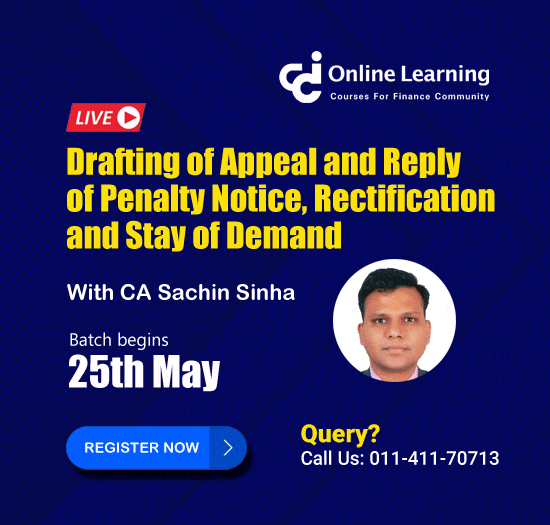ITC is the biggest area of dispute in GST. Already, many taxpayers are dwindling with issues in claiming ITC itself, such as the following:
1. Time-barring period of ITC due to claiming ITC in GSTR-3B late
Claim of ITC in GSTR-3B after the time barring period. Say The ITC of FY 21-22 is availed in the GSTR-3B of Nov'2022 filed in Dec'22 instead of the GSTR-3B filed in Nov'22 for Oct'22.
2. Time barring period for ITC due to filing GSTR-3B late
Delayed filing of GSTR-3B as per erstwhile time barring period u/s 16(4) of CGST Act 2017. Say the GSTR-3B of Sep'2021 is filed on October 25th instead of October 20th, which is the time barring date for taking ITC for FY 2020–21.

3. Time-barring period of ITC due to non-claim of ITC in GSTR-3B itself
Taking the ITC for, say, FY 22–23 in the annual return of FY 22–23 filed on December 31st, instead of taking the ITC in the GSTR-3B filed until November 30th,.
While it is a fact that there has to be a time-barring period for claiming ITC, the question is whether the ITC may be claimed as per the books of accounts or GSTR-3B or GSTR-2A/2B. The Hon'ble Apex Court in the case of Bharti Airtel in 2021 answered a cardinal question on whether RTPs can avail ITC on the booked maintained and records as per the provisions of the CGST Act, 2017 (Section 16) and whether RTP is obliged to do self-assessment of ITC u/s 59. It held that RTP should reckon its eligibility for ITC and output tax liability, including the balance amount lying in cash or credit ledger, primarily on the basis of his office record and books of accounts. The common portal is only a facilitator to feed or retrieve such information and need not be the primary source for doing self-assessment. Hence, the books of accounts are the primary source for claiming ITC. The Court, inter alia, held that
"The supply of goods and services becomes taxable in respect of which the registered person is obliged to maintain agreements, invoices, challans, and books of accounts, which can be maintained manually or electronically. The common portal is only a facilitator to feed or retrieve such information and need not be the primary source for doing self-assessment. The primary source is in the form of agreements, invoices or challans, receipts of goods and services, and books of accounts, which are maintained by the assessee manually or electronically. These are not within the control of the tax authorities. This was the arrangement even in the pre-GST regime while discharging the obligation under the concerned legislation(s). The position is no different in the post-GST regime, both in the matter of doing self-assessment and regarding dealing with eligibility for ITC and OTL. Indeed, self-assessments and declarations would be in any way subject to verification by the tax authorities. The role of tax authorities would come at the time of verification of the declarations and returns submitted or filed by the registered person."
In case of the time barring period of ITC u/s 16(4) of The CGST Act 2017 due to a mere late filing of the GSTR-3B, it may be noted that the GST Portal was not allowing to file GSTR-3B returns without payment of the tax in cash, and in case it was the reason for the belated GSTR-3B Return, it now could not be the reason for rejection of ITC u/s 16(4) of The CGST Act 2017. If the GSTN (Goods and Services Tax Network) allowed filing GSTR-3B returns without tax payment or incomplete GSTR-3B submissions, the RTPs could rightfully claim the input tax credit before the period mentioned in § 16(4). The Hon'ble Madras High Court in the case of Tvl.Kavin HP Gas Gramin Vitrak vs. The Commissioner of Commercial Taxes [W.P. (MD) Nos. 7173 and 7174 of 2023 and W.M.P. (MD) Nos. 6764 and 6765 of 2023] dated November 24, 2023 acknowledged the genuine practical difficulty faced by the petitioner and urged the authorities, while recognizing the GST Council as the suitable body, to take corrective measures. Pending the resolution, the bench ruled in favor of the assessee, instructing authorities to permit dealers to file returns manually. Requiring the RTPs to comply with Section 16(4) is against the principle of Lex Non-Cogito Ad Impossible, i.e., the law does not compel a man to do that which he cannot possibly perform. Since the law cannot compel the taxpayers to comply with impossible conditions, the proposal to deny ITC under Section 16(4) is not sustainable.
Now, a question again arises: if the ITC is available to the RTP, then just because he has not availed in the GSTR-3B but claimed in the GSTR-9, does it become ineligible? In this regard, the Hon'ble Madras High Court held as under in the case of M/s SRI SHANMUGA HARDWARES ELECTRICALS vs. THE STATE TAX OFFICER, SALEM [2024-VIL-180-MAD]. -
1. When the registered person asserts that he is eligible for ITC by referring to GSTR-2A and GSTR-9 returns, the assessing officer should examine whether the ITC claim is valid by examining all relevant documents like invoices, e-waybills, consignment notes, contracts, purchase orders, proof of delivery, etc.
2. A claim for ITC cannot be rejected merely on the ground that the GSTR-3B returns did not reflect the ITC claim.








 CAclubindia
CAclubindia

